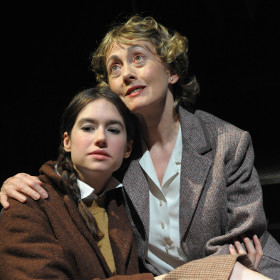Michael Coveney: Beyond the West End in Dalston and Richmond
A long gap in West End openings has allowed Michael Coveney to cast his critical eye beyond central London
The West End does not strike me as inactive – although it may be made a little more inactive by a strike of Tube train staff this week – but when I next attend a West End opening in the middle of March, it will have been two months since I attended the last West End opening in the middle of January.
I'm talking West End proper, in the "Shaftesbury Avenue" sense of the word, and therefore overlooking, for the sake of argument, openings at the St James in Victoria, the Donmar in Covent Garden, the National on the South Bank, the Royal Court, and so on. From The Weir at Wyndham's to Blithe Spirit at the Gielgud is a long haul indeed.

And yet the activity in the London theatre at large remains simply staggering. Two examples of this "world elsewhere," complete with their own particular audience following, are the ongoing repertoire of Spanish Golden Age drama at the Arcola in Dalston, and the changing weekly repertoire – this week, a touring production of Diane Samuels' Kindertransport – at the Richmond Theatre.
Neither project is dusted in West End glitter, exactly, yet the Arcola was packed and buzzing on Saturday night, while the Richmond Theatre on the green, a glorious Victorian venue designed by the maestro, Frank Matcham, was heaving; so heaving, in fact, that when I turned up last night, my first reaction to the sight of people spilling up and down the steps outside was that there must have been an incident and an audience evacuation before we'd even started. Oh no… not another ceiling caving in… oh no, thrice no, it wasn’t.
Part of the attraction of the Arcola season is the chance to see ten actors playing across three plays, and plays of extraordinary interest, too. The 17th century classics – two by Lope de Vega, one by Tirso de Molina – are co-produced by Laurence Boswell's Ustinov Studio in Bath, Mehmet Ergen's Arcola and Hamish Glen's Belgrade in Coventry.
All three plays have notably good translations – by Irish poet Sean O'Brien, opera librettist Meredith Oakes and Golden Age specialist David Johnston – and, while not intricately related, they do turn a revealing and reflective prism on the Spanish society of the time, with its authoritarian fathers, eligible daughters, prancing dukes and assorted servants and buffoons.
In Lope's La Dama Boba – translated by Johnston as A Lady of Little Sense – we have an ebullient comedy of two wealthy, marriage-able daughters making their matches on their own terms, not dissimilar to the situation in The Taming of the Shrew; but whereas Shakespeare's headstrong Kate is a termagant subdued by unconventional wooing, Lope's Finea is an apparent simpleton transformed by love into a highly intelligent operator.
And, as in The Shrew, there is an amusing gallery of stupid suitors, a scheming father and – in Simon Scardifield's third delicious performance of the season – a trusting, thwarted booby almost outflanked at every turn. Frances McNamee, also tremendous throughout, is a hilarious and physically resourceful Finea, while the rest of the company – which includes Katie Lightfoot, William Hoyland, Annie Hemingway and Nick Barber – register further intriguing variations on stock characters.
In among the comedy mayhem there are quite a few nuggets to provide chin-stroking pause for thought, such as, "Don't ask for pears from an elm tree," (never a good idea) and, more to the point, "Love is like chicken stew: poke around long enough and you'll find the meat!"
No such quiddities and quippery in Kindertransport, but how could there be in Samuels' sombre, schematic 1993 drama of mothers and daughters across the generations and either side of the last war? It's grimsville all round, focusing on the transportation of young Jewish children from Germany to England before the full-scale deportation of their parents to the death camps.
So, nine-year-old Eva, a fictitious example of the "kinder," is adopted into a Manchester family in 1938 and, after the war, rejects her natural mother, who has survived Auschwitz, in favour of her adoptive one; at the same time, "Evelyn" as she now is, fends off, in middle age, the importunate queries of her own daughter, Faith, who is clearing out the attic and leaving home.
Depressed Emma Deegan and chirpy Paula Wilcox are the rival mums, Janet Dibley increasingly effective as Evelyn, Gabrielle Dempsey not too annoying as younger Eve and Paul Lancaster a token male odd job merchant and dastardly symbolic "rat-catcher." The audience was palpably moved by it all. I was moved more by them than I was by the play itself.
But Andrew Hall's production, presented by Hall and Childs Ltd, the Booking Office and – here we are again – the Belgrade in Coventry, keeps interest alive, just about, around a fascinating and important subject; it's not as if refugees are exactly a thing of the past these days. And there's a few more weeks to mull it all over before "show time" with Angela Lansbury cheering us all up in Blithe Spirit in March, just three days after the Arcola season wraps and moves on to Coventry.
See Also: Angela Lansbury on bringing Blithe Spirit to London












